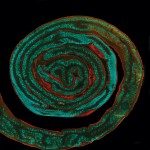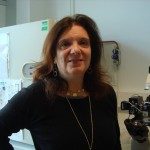Lien vers Pubmed [PMID] – 16804542
Nat. Genet. 2006 Jul;38(7):770-8
Auditory neuropathy is a particular type of hearing impairment in which neural transmission of the auditory signal is impaired, while cochlear outer hair cells remain functional. Here we report on DFNB59, a newly identified gene on chromosome 2q31.1-q31.3 mutated in four families segregating autosomal recessive auditory neuropathy. DFNB59 encodes pejvakin, a 352-residue protein. Pejvakin is a paralog of DFNA5, a protein of unknown function also involved in deafness. By immunohistofluorescence, pejvakin is detected in the cell bodies of neurons of the afferent auditory pathway. Furthermore, Dfnb59 knock-in mice, homozygous for the R183W variant identified in one DFNB59 family, show abnormal auditory brainstem responses indicative of neuronal dysfunction along the auditory pathway. Unlike previously described sensorineural deafness genes, all of which underlie cochlear cell pathologies, DFNB59 is the first human gene implicated in nonsyndromic deafness due to a neuronal defect.


